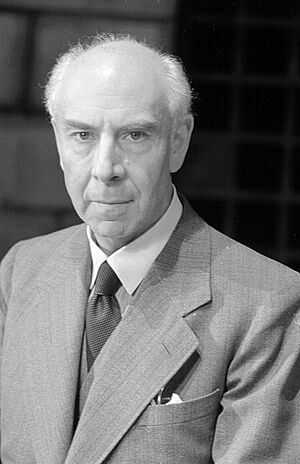Robert Heger facts for kids
Robert Heger (born August 19, 1886 – died January 14, 1978) was a famous German conductor and composer. He was born in Strasbourg, which was then part of Alsace-Lorraine. Heger was known for leading orchestras and writing his own music.
Contents
Life and Career
Early Musical Journey
Robert Heger began his musical studies at the Conservatory of Strasbourg. There, he learned from a teacher named Franz Stockhausen. He continued his training in Zurich with Lothar Kempter. Later, he studied in Munich under Max von Schillings.
Heger started his career as a conductor in Strasbourg. His first big performance was in Ulm around 1908 or 1909. After that, he worked in several cities. These included Barmen in 1909 and the Vienna Volksoper in 1911. In 1913, he moved to Nuremberg. There, he led both operas and Philharmonic concerts.
Leading Famous Orchestras
Heger went on to conduct in Munich and Vienna. He made a wonderful recording of Goldmark's Rustic Wedding Symphony. He worked with the famous Vienna Philharmonic orchestra for this recording. From 1933 to 1950, he conducted in Berlin. A live recording of the opera Lohengrin from wartime was saved. After his time in Berlin, he returned to Munich.
In 1932, Heger conducted a special concert. He led the Vienna Symphony Orchestra. They performed Maurice Ravel's Piano Concerto for the Left Hand. This was the first time this piece was ever played in public. The pianist was Paul Wittgenstein, who played with only one hand.
Conducting During Difficult Times
Robert Heger continued his musical work during a challenging period in history. In 1937, he joined a political party. He conducted one of the last concerts of the Berlin Philharmonic. This concert took place on April 12, 1945. It was just before a major battle in Berlin. The orchestra played music by Wagner, Beethoven, and Bruckner.
International Performances
Heger also conducted at the Royal Opera House in Covent Garden, London. He performed there from 1925 to 1935. He returned in 1953 with his Munich opera company. During this visit, he led the first London performance of Richard Strauss's opera Capriccio.
Later in his life, in the 1960s, Heger made stereo recordings. One notable recording was of Schubert's complete Rosamunde music. Robert Heger passed away in Munich at the age of 91.
His Music
Robert Heger was also a talented composer. He wrote four operas during his career. Here are some of his other musical works:
- The Jewess of Worms (a melodrama)
- Pianoforte trio, op 14 (music for three instruments)
- Songs
- A Festival at Haverslev (an opera with three acts, first performed in Nuremberg in 1919)
- Hero and Leander (a symphonic drama for a full orchestra), op. 12
- Violin concerto in D major op. 16 (a piece for violin and orchestra)
- Symphony in D minor (a large musical work for orchestra)
- A Song of Peace (a choral work for singers, chorus, orchestra, and organ)
Awards and Honors
Robert Heger received several important awards and honors for his contributions to music:
- 1956: Grand Merit Cross of the Federal Republic of Germany
- 1959: Bavarian Order of Merit
- 1961: He was made an Honorary Citizen of Munich.
- 1961: He became a Member of the Bavarian Academy of Fine Arts.
- 1967: Austrian Cross of Honour for Science and Art, 1st class
 | Calvin Brent |
 | Walter T. Bailey |
 | Martha Cassell Thompson |
 | Alberta Jeannette Cassell |


